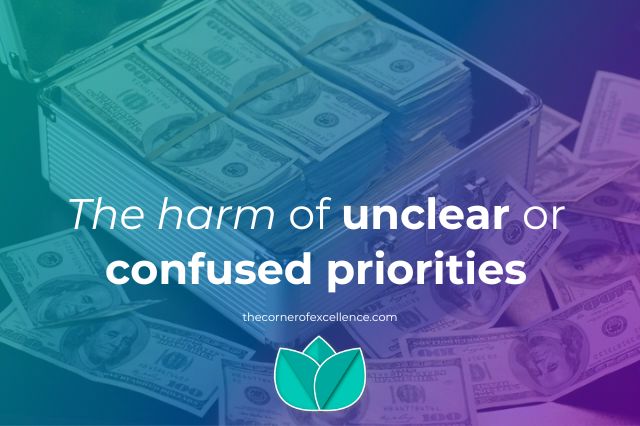Knowing your priorities, that is, what really matters to you at heart, helps you have a more fulfilled life. Feeling dissatisfied with your life or tending to act in a self-destructive way are good signs that something is wrong. You may not be clear about your priorities. You may be but your actions are not aligned with them. Or perhaps your priorities are confused.
Let us review the different cases and their signs so that you can give more meaning to your life and feel more at ease.
Signs of not being clear about your priorities
A sign of not being clear about your priorities is feeling lost or out of control over what happens. Life is something that happens around you and you seem like a mere spectator. You react to what happens instead of actively and proactively deciding to influence events. You probably languish and procrastinate.
You may also feel overwhelmed by work, family and work obligations, errands, and miscellaneous tasks. But, despite doing a lot of things, you do not have a sense of accomplishment and satisfaction at the end of the day.
It may be because you live in ambiguity with your core values. In other words, you have not taken time to think about what matters most to you in order to establish your priorities from there.
Your priorities and actions are not aligned
You may think you do know your priorities. However, your actions do not demonstrate what is supposed to be most important to you. Maybe you think that your well-being and health are important but you do not manage to take enough time to take care of yourself.
Or perhaps you consider your family the most important thing. However, when it comes to the crunch, how do you prove it? Do you spend quality time with them? Another example can be personal development. You may say that you want to be a good professional or grow as a person. But then you do not find time to learn new things and develop your skills.
Like these three, there are many more examples of what we say is important to us and what we then actually do. The result is usually to feel dissatisfied, that you do not do enough or that you cannot cope.

Signs of confused priorities
However, worse than the previous points is focussing on confused priorities. No matter how much you achieve goals aligned with these priorities and focus your life towards them, they ultimately do not make you happy. You feel a certain emptiness and constant dissatisfaction.
Confused priorities hurt your self-confidence and well-being. All of this can lead to mental problems such as anxiety or depression. It can cause you constant stress and lead to addictive behaviors. A bad relationship with money can also be an indicator.
Examples of confused priorities
But how to detect confused priorities? On the one hand they are recognisable by aspirations based on appearances and on superficial and material things. On the other hand, in allowing yourself to be imposed priorities by others and aspire to what others tell you is important.
Superficial priorities
Priorities based on material and superficial things can be: giving great importance to the looks, to money and status symbols, and to fame or power, for example.
The problem with those priorities is that you feel like you never have enough. Success will always taste like too little. In addition, scientific studies have shown that the gratification, which the acquisition of material goods provides us, lasts very little.
Priorities imposed by others
Be it either because you care a lot about what others think of you, because you do not dare to be assertive, or because you are not clear about what you want. But living up to what others tell you is important will make you unhappy.
You may never have taken the time to figure out what you really want. But it is one thing to look outside for inspiration. Another thing is to take what society or your environment seem to say is a priority as the only truth.
We are all unique and therefore priorities cannot be universal. In other words, what is very important for one person does not have to be for another. Living in core value incongruence, i.e. not aligned with what matters most to you, causes stress, dissatisfaction, and a sense of lack of control and direction.
How to figure out your priorities
We have seen that knowing your own priorities is key to being happier, having more self-confidence and self-esteem, as well as being productive and feeling satisfied. But how to figure out your priorities?
First of all, it requires knowing yourself. What do you really want? What do value? Which are your aspirations? What is your life purpose? Once you know, think about how you should orient your life and what you should spend your time on so that your actions reflect what is important to you.
If a priority, I have given as an example of superficial, comes to mind, ask yourself what is really behind that aspiration. Most likely, it is to feel more loved, appreciated, respected, or safe. If so, one of your priorities perhaps ought to be personal or professional development. In the case of personal development, it could be about working on your self-love, your self-acceptance or your emotional intelligence. In terms of professional development, it could be a matter of expanding your knowledge and skills in your field to have better job opportunities.

Why we lose ourselves in lower priorities
Although we are clear about our priorities, sometimes we find it difficult to dedicate the proper time to them. We lose ourselves in lower priority things.
Urgency, difficulty and novelty
One reason for this may be that the lower priority stuff is often the more urgent. You dedicate your efforts to what catches your attention, losing sight of what is most beneficial in the long run.
Another reason may be that the priority things seem more difficult. It requires more effort so it feels more comfortable to procrastinate and dedicate ourselves to lower priority things. Those less important things can be easier to finish and thereby give us a sense of immediate accomplishment and gratification. The highest priority things often do not bring immediate results that you can enjoy.
In addition, the lower priority things can seem more exciting and new. Persevering day after day with your priorities can be tough. So, if something new comes along, our attention may get distracted.
Others’ opinions and demands
You may also feel pushed to dedicate yourself to things that are less of a priority. The opinions and advice from others or the indications of your boss can make you doubt your priorities. It is convenient to be flexible and know how to adapt to the demands that may arise as well as have an open mind to different points of view. But despite this, we should not lose sight of what is most important to ourselves.
Life is what happens
Remember the phrase: “Life is what happens while you are busy making plans.” Family emergencies, urgencies and unforeseen events can require our attention and dedication, and disrupt the plans we had. The point is that we do not get lost in the labyrinth of the immediate and do not forget our priorities. Once you have “put out the fire,†remember your priorities and return your attention to them.
You evolve and your priorities, too
Finally, keep in mind that priorities evolve just as you evolve as a person. Your priorities will not be the same as a young teenager, young adult, or more mature adult. That is why it is convenient to review your priorities from time to time and ask yourself again what it is that really matters most to you.
Are your priorities confused or unclear?
Do you think you are clear about your priorities? Are they what really matters to you? Or do you let yourself be influenced by what society or your environment seem to ask of you?

Sharing is caring!




